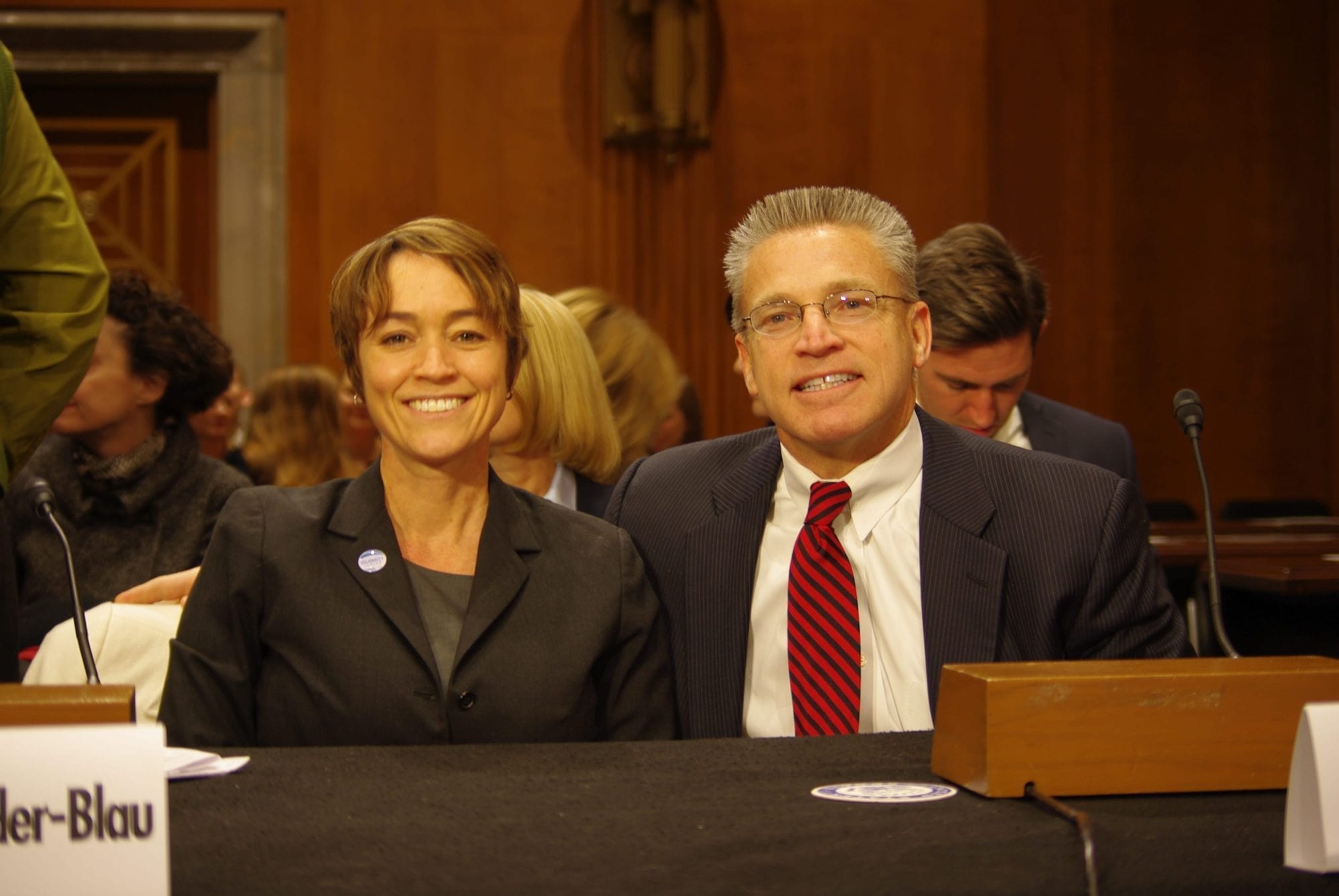
Feb 4, 2015
Understanding the link between worker rights violations and human trafficking is the key to ending modern slavery, Solidarity Center Executive Director Shawna Bader-Blau testified today on Capitol Hill.
“Most modern slavery today is, in fact, forced labor,” Bader-Blau told the U.S. Senate Committee on Foreign Relations. “Trafficking for labor exploitation is far more prevalent than sex trafficking globally, accounting for 68 percent of trafficked people.” (Watch a video of the full hearing.)
Bader-Blau and other expert witnesses at the hearing, “Ending Modern Slavery: What is the Best Way Forward?” discussed actions and policies to help end human trafficking, debt bondage and other forms of modern slavery in supply chains around the world, including in the United States.
The vast majority of the almost 21 million people in forced labor globally are exploited in the private economy, Bader-Blau said in oral remarks and testimony submitted for the record. Illegal profits made from the use of forced labor worldwide is $150 billion per year, “exceeding the GDP of many countries.”
Instead of shackles and chains, workers are now enslaved through threats, debt and other forms of economic coercion, she said.
“We must move beyond the notion that modern “slavery is all about bad individuals doing bad things to good people,” Bader-Blau said. “We must address what one leading global expert on the international law of human trafficking, calls the ‘underlying structures that perpetuate and reward exploitation, including a global economy that relies heavily on exploitation of poor people’s labor to maintain growth and a global migration system that entrenches vulnerability and contributes directly to trafficking.’”
Bader-Blau said that based upon more the Solidarity Center’s more than 20 years of experience in the areas of child labor, migrant worker exploitation and supply chain accountability, the following steps are essential to ending human trafficking:
- Reform unsafe migration practices, which includes regulating labor recruiters, many of whom manipulate and deceive workers for profit, and banning recruitment fees, which is a primary source of debt bondage and forced labor.
- End impunity for labor traffickers. Forced labor is pervasive around the world because employers who engage in modern slavery face few consequences.
- Make it impossible for governments to allow forced labor and for companies to get away with it, including down their supply chains. Many countries with significant labor trafficking problems continue to receive trade preferences from the U.S. government, said Bader-Blau.
- Promote worker-driven solutions. Workers are key to eradicating forced labor and trafficking in supply chains. They see abuses or may themselves be exploited. First-hand reporting of abuses and exploitation by workers, unions and rights organizations shines a light on abusive practices long before a third party decides to take a look.
The other witnesses included Gary Haugen, president of the International Justice Mission; David Abramowitz, vice president of Policy and Government Relations at Humanity United; James Kofi Annan, founder of Challenging Heights, a child labor rescue organization in Ghana; and Shandra Woworuntu, a trafficking survivor.
Read Bader-Blau’s full testimony.

Feb 3, 2015
A coalition of worker and human rights organizations, including the Solidarity Center, is urging the U.S. State Department to maintain Uzbekistan’s rank at the bottom of its “Trafficking in Persons” report when it is released this year. (Read the full document.)
“In 2014, the government of Uzbekistan forced more than a million citizens to work in the cotton fields under threat of penalty, for its benefit, and as a matter of state policy,” the groups write in a 15-page document detailing the Uzbekistan government’s coercion of public servants and other workers—including children—to toil in cotton fields.
The document notes that at least 17 people died due to unsafe working conditions during last fall’s harvest. Workers forced to pick cotton were not given any time off—including weekends and holidays. Organizations monitoring the harvest reported that workers were provided with no protective gear, such as gloves.
Public organizations, including schools, were required to provide between 30 percent and 60 percent of their staff for the duration of the harvest, and in some cases, up to 80 percent of their staff. Children often had no classes during these weeks because teachers were working in the fields. Clinics and hospitals had few or no medical personnel.
Many employees were threatened with loss of employment, loss of utilities and other public services, social exclusion, fines, administrative harassment, and criminal prosecution if they did not participate in the cotton harvest, the report states.
The 2014 Trafficking in Persons report gave Uzbekistan a “Tier 3” ranking, a designation that indicates a country is not complying with the U.S. Trafficking Victims Protection Act’s minimum standards nor making attempts to do so. The coalition says that maintaining the Tier 3 ranking is essential to convey to the Uzbekistan government the need to end forced labor.
A Tier 3 ranking makes countries liable to sanctions, which could include the withholding or withdrawal of U.S. non-humanitarian and non-trade-related assistance.
The coalition further notes that “the government of Uzbekistan’s use of forced labor to produce cotton is supported by its denial of fundamental rights of association, freedom of press and due process to enable its use of forced labor to produce cotton.”
The 2014 Trafficking in Persons report found that Uzbekistan’s “government-compelled forced labor of men, women, and children remains endemic during the annual cotton harvest….There were reports that some children aged 15 to 17 faced expulsion from school for refusing to pick cotton.”
Uzbekistan also was at the bottom of the 2014 Findings on the “Worst Forms of Child Labor” report released in October by the U.S. Labor Department.
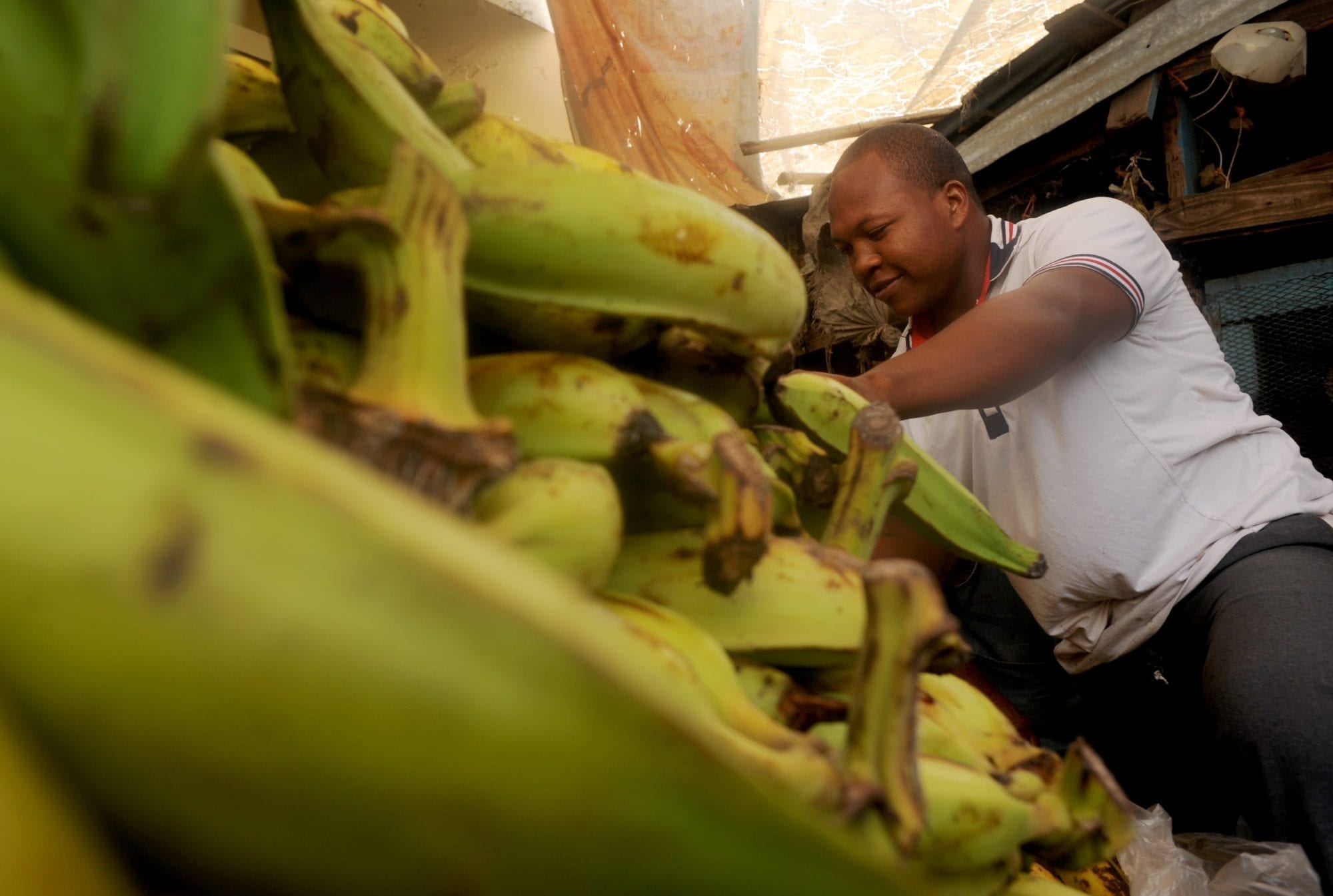
Jan 29, 2015
Amparo Lara sells plantains in San Cristobal’s Municipal Market, vying for customers along with dozens of other vendors selling mangoes, guavas and a range of vegetables and herbs along with services, such as shoe repair.
The increasing lack of full-time jobs around the world has forced many working people like Lara to seek a living in the precarious informal economy. These market vendors, domestic workers, pedicab drivers and day laborers work for meager wages in jobs unregulated by safety and health standards and typically have no access to pensions, sick leave or worker compensation.
[portfolio_slideshow id=2803]
The Solidarity Center helps workers in the informal economy come together to gain the knowledge and confidence to assert their rights and raise living standards. In 35 countries, we provide trainings and programs to help precarious workers better understand their rights, organize unions to mitigate job vulnerabilities, and learn to bargain for improved conditions and wages.
In the Dominican Republic, where a thriving informal economy includes both Dominicans and Haitians, the Solidarity Center has mobilized many of these workers, forming an organization where they can better stand up for their rights and improve their wages and working conditions.
Through the Féderacion Nacional de Vendedores de los Mercados (FENAVEMER), street sellers like Lara have a collective voice on the job, enabling them to better seek their share of the country’s economic prosperity.
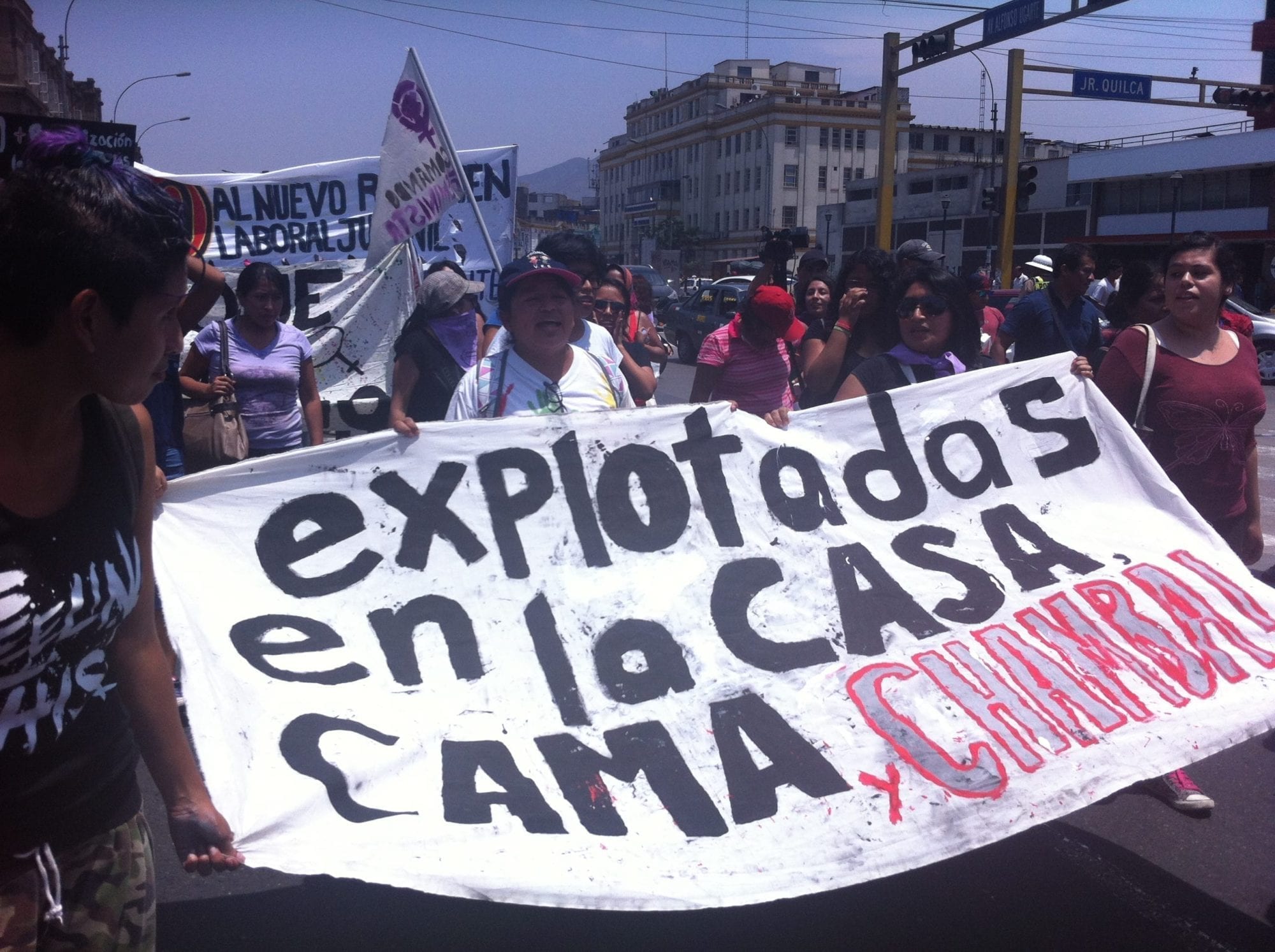
Jan 28, 2015
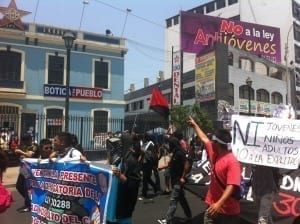
Credit: Solidarity Center/Luis Mendoza
Workers in Peru are celebrating the repeal this week of a labor law that targeted young workers, a huge victory that followed weeks of street demonstrations and protests by working people and their unions.
Peru’s Congress voted 114–91 to repeal the law, which reduced salaries and benefits for workers under age 25. A recent poll showed only one-fifth of Peruvians supported the law.
“They never asked young people what they thought,” says one worker, who took part in the protests.

The secretary general of the Topitop textile union featured on the cover of Peru’s La Republica as workers celebrated repeal of the labor law.
Ultimately, workers say, the law would not only have harmed young workers.
Jorge, an apparel worker at a Topitop factory that employs 2,400 workers, puts it this way: “What the company wants is to fire us and replace us with younger workers without any benefits.” Adds Abel, also a garment worker: “What we are doing is defending ourselves, our children and our future grandchildren.”
Young labor activists from the textile and apparel, export-oriented agriculture and mining sectors took vocal positions against the law and helped lead protests. The Solidarity Center, with support from the U.S. Department of Labor, works closely with young Peruvian worker activists to help them analyze their labor rights; develop leadership, negotiating and organizing skills; and learn to advocate for their issues.
As students, young workers and the Peruvian labor movement look toward upcoming campaigns to push for approval of a general labor law, an increase in the minimum wage and the repeal of another recent law that makes it easier for employers to conduct mass layoffs, the Solidarity Center plans to continue to work alongside union allies at the workplace, federation and confederation level to identify lessons learned from this experience and ensure that young workers can continue to provide leadership in union building and policy campaigns.
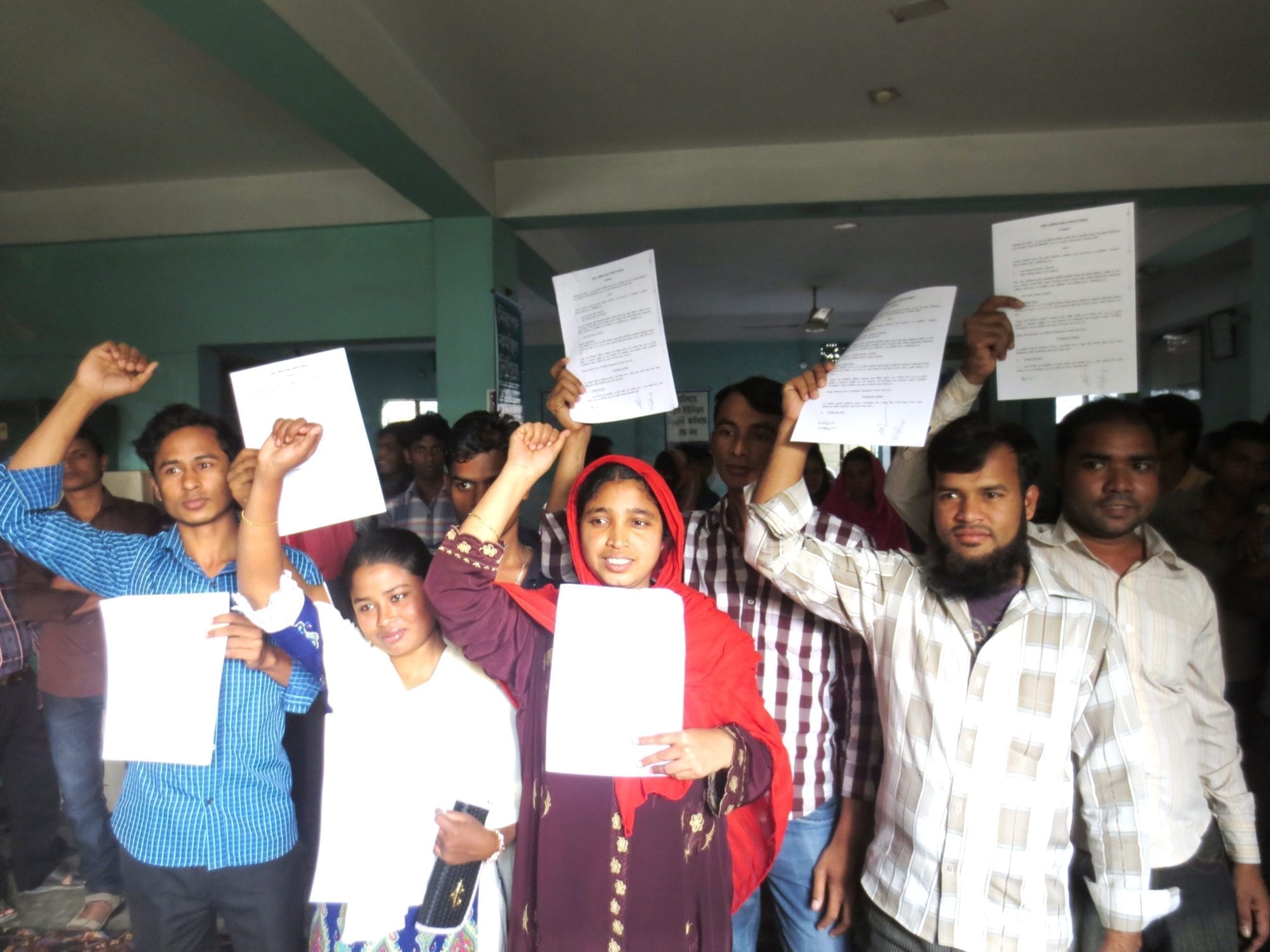
Jan 27, 2015
Standing strong in the face of a long and difficult struggle for their rights, Bangladesh garment union leaders at five factories in the East-West Industrial Park Ltd. group negotiated collective bargaining agreements in recent days that include increases in the food allowance, improvements in canteen facilities and provisions for union leaders to assist members.
The five union factories are affiliated with the Bangladesh Independent Garment Workers Union Federation (BIGUF), which helped negotiate an earlier agreement in May 2014 to resolve hostilities and lay the groundwork for good-faith bargaining. The Solidarity Center provided legal and other technical assistance to workers throughout the process.
Hamidul Islam, general secretary of the Rumana Fashion Ltd. Workers Union, which represents workers at one of factories in the group, said that despite the challenges leading up to the victory, “This is really just a starting point (for our union). We will be able to help workers the most if we can continue to discuss with the management about how to create a better working environment.”
Further, he said, “the days would have been harder and longer had it not been for the help of BIGUF and the Solidarity Center. It is still hard to believe that we are one of the few factories that have a signed collective bargaining agreement in the country’s entire garment industry. But we know it’s because we are strong and stuck together.”
Shahera, general secretary of Fashion Suit & Trousers Ltd. who was also involved in negotiations, said, “A union is about workers claiming their rights by being together, and I want to encourage other unions not to give up.”
However, workers who formed unions at five other factories in the group are still working to gain legal recognition by authorities.
“We are very encouraged by the progress that’s been made at the East-West group and will help the union leaders now work to implement the collective bargaining agreements in the factories,” said Raju, BIGUF acting general secretary.
“However, we continue to be concerned about the trade union registration process and that workers who have worked hard to organize their factories are having their unions unfairly rejected by the government.”







